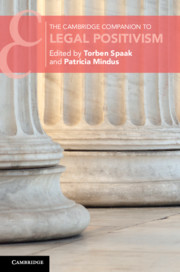Book contents
- The Cambridge Companion to Legal Positivism
- Cambridge Companions to Law
- The Cambridge Companion to Legal Positivism
- Copyright page
- Contents
- Figures
- Contributors
- Acknowledgements
- 1 Introduction
- Part I Fundamentals
- Part II History
- Part III Central Figures
- Part IV Main Tenets
- 17 Social-Practice Legal Positivism and the Normativity Thesis
- 18 Social Facts and Legal Facts: Perils of Hume’s Guillotine
- 19 The Scope of Legal Positivism: Validity or Interpretation?
- 20 What Is Law and What Counts as Law? The Separation Thesis in Context
- 21 The Origins of Inclusive Legal Positivism
- 22 Disruptive Implications of Legal Positivism’s Social Efficacy Thesis
- 23 The Semantic Thesis in Legal Positivism
- Part V Normativity and Values
- Part VI Critique
- Index
- References
17 - Social-Practice Legal Positivism and the Normativity Thesis
from Part IV - Main Tenets
Published online by Cambridge University Press: 21 January 2021
- The Cambridge Companion to Legal Positivism
- Cambridge Companions to Law
- The Cambridge Companion to Legal Positivism
- Copyright page
- Contents
- Figures
- Contributors
- Acknowledgements
- 1 Introduction
- Part I Fundamentals
- Part II History
- Part III Central Figures
- Part IV Main Tenets
- 17 Social-Practice Legal Positivism and the Normativity Thesis
- 18 Social Facts and Legal Facts: Perils of Hume’s Guillotine
- 19 The Scope of Legal Positivism: Validity or Interpretation?
- 20 What Is Law and What Counts as Law? The Separation Thesis in Context
- 21 The Origins of Inclusive Legal Positivism
- 22 Disruptive Implications of Legal Positivism’s Social Efficacy Thesis
- 23 The Semantic Thesis in Legal Positivism
- Part V Normativity and Values
- Part VI Critique
- Index
- References
Summary
Bertea considers two ways of understanding the social thesis, along the lines of either legal conventionalism or the conception of law as a shared activity, arguing that on neither interpretation of the social thesis can legal positivism account for the necessary normativity of law, that is, for the necessary capacity of law to impose (genuine) obligations and confer (genuine) rights on both officials and citizens. He points out that there are fundamentally two ways in which legal positivists conceptualise legal obligation – either as a genuine requirement set forth in the law or as a perspectival requirement – and that on the former conceptualisation, legal obligations will bind only those who are committed to the legal enterprise, that is, the officials, and that on the latter, they will bind only those who adopt the standpoint of the legal system itself. Further, he objects that on the former conceptualisation, legal positivism fails to account for legal obligations that apply to the citizens, and that on the latter interpretation, it turns out that law might not be necessarily normative in the first place.
Keywords
- Type
- Chapter
- Information
- The Cambridge Companion to Legal Positivism , pp. 397 - 418Publisher: Cambridge University PressPrint publication year: 2021
References
- 1
- Cited by

